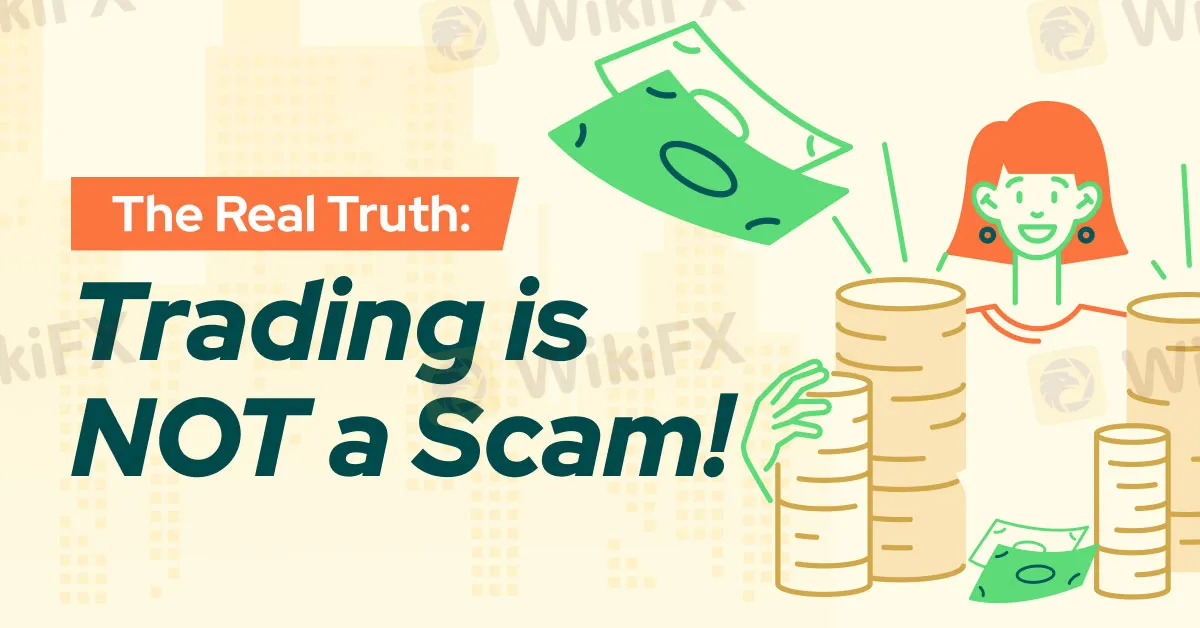简体中文
繁體中文
English
Pусский
日本語
ภาษาไทย
Tiếng Việt
Bahasa Indonesia
Español
हिन्दी
Filippiiniläinen
Français
Deutsch
Português
Türkçe
한국어
العربية
The Real Truth: Trading is NOT a Scam!
Abstract:In the dynamic world of financial markets, where opportunities abound, the notion of trading being a scam often arises, fuelled by misconceptions and unfortunate experiences. However, is this really the truth?

In the dynamic world of financial markets, where opportunities abound, the notion of trading being a scam often arises, fuelled by misconceptions and unfortunate experiences. It is imperative to dispel this myth and recognize that trading itself is not a scam; rather, it is the pitfalls of human behaviour – greed, fear, and lack of education – that can lead individuals astray.
Trading, when approached with diligence and a well-informed mindset, is a legitimate and potentially lucrative endeavour. However, the truth is that many individuals fall victim to scams or experience significant losses due to their own psychological and educational shortcomings.
The first step towards debunking the myth that trading is a scam involves understanding the inherent risks involved. Financial markets are volatile, influenced by a myriad of factors such as economic indicators, geopolitical events, and market sentiment. Lack of knowledge about these factors can lead to poor decision-making and financial losses.
It is crucial for traders to acknowledge that the market's unpredictability is not a scam but rather an inherent characteristic. Professional traders or full-time retail traders invest time in learning about market dynamics, technical and fundamental analysis, and risk management to navigate the uncertainties effectively.
One of the primary culprits behind the misconception that trading is a scam is human greed. The desire for quick and substantial profits can blind individuals to the risks involved, leading them to fall prey to fraudulent schemes or make impulsive, uninformed trades.

Successful traders recognize the importance of discipline and strategic decision-making. They approach trading with realistic expectations, understanding that consistent profitability is a result of a well-thought-out and disciplined trading plan, not a shortcut to overnight wealth.
On the flip side, fear can be equally detrimental to traders. Fear of losses or missing out on potential gains can trigger emotional responses that cloud judgment. Unchecked emotions often result in impulsive decisions, leading to significant financial setbacks.
Education plays a pivotal role in mitigating fear. Traders who invest time in understanding market dynamics, risk management, and developing a robust trading strategy are better equipped to make rational decisions, minimizing the impact of fear on their trading activities.
Perhaps the most significant contributor to the misconception of trading as a scam is the lack of education. Trading is a skill that requires continuous learning and adaptation to changing market conditions. Individuals who jump into trading without a solid understanding of market principles and strategies are setting themselves up for disappointment. Education empowers traders to make informed decisions, assess risk factors, and develop strategies tailored to their financial goals. Recognizing the importance of education is a crucial step in debunking the myth that trading is a scam.
In conclusion, the real truth is that trading is not a scam; rather, it is the human elements of greed, fear, and lack of education that can lead to unfavourable outcomes. Traders must approach the financial markets with a mindset focused on continuous learning, discipline, and strategic decision-making.
Acknowledging the risks, understanding market dynamics, and cultivating a disciplined approach are essential for long-term success in trading. The journey towards profitable trading begins with self-awareness, education, and a commitment to overcoming the psychological pitfalls that often lead to misconceptions about the legitimacy of trading as a financial pursuit.

WikiFX, a renowned platform in the forex industry, offers valuable resources and features to help traders navigate these challenges. By providing comprehensive broker assessments, including transparency ratings, regulatory information, and user reviews, WikiFX empowers traders to make informed decisions and avoid potential scams. Through educational content and market insights, WikiFX equips traders with the knowledge and tools necessary to understand market dynamics, manage risks effectively, and develop robust trading strategies. By leveraging the features offered by WikiFX, traders can approach the financial markets with confidence and overcome the misconceptions surrounding trading as a scam. Download yours now!

Disclaimer:
The views in this article only represent the author's personal views, and do not constitute investment advice on this platform. This platform does not guarantee the accuracy, completeness and timeliness of the information in the article, and will not be liable for any loss caused by the use of or reliance on the information in the article.
Read more

Doo Financial Expands Reach with Indonesian Regulatory Licenses
PT. Doo Financial Futures, a subsidiary of the global financial services brand Doo Group, has secured regulatory approval from Indonesia’s Badan Pengawas Perdagangan Berjangka Komoditi (BAPPEBTI).

Investment Scams in Malaysia: Telegram Tops Scammers’ List
In the first 11 months of 2024, Malaysia recorded 5,685 investment scams, with Telegram emerging as the most commonly used platform for fraudulent activities.

What Are The Common Types of Unregulated Forex Brokers?
Protect your investments from unregulated forex brokers with these tips. Learn about red flags, scams, and how the WikiFX app ensures safe trading experiences worldwide.

CySEC Launches Redesigned Website Packed with New Features
CySEC unveils a redesigned website with advanced search tools, centralized resources, and a news section, enhancing accessibility, transparency, and user experience.
WikiFX Broker
Latest News
Spotware Unveils cTrader Store, Global Marketplace for Algo Creators
Elderly Trader Loses RM2.1M in WhatsApp Forex Scam
Gigamax Scam: Tracking Key Suspects in RM7 Million Crypto Fraud
Singaporean Arrested in Thailand for 22.4 Million Baht Crypto Scam
Trader Turns $27 Into $52M With PEPE Coin, Breaking Records
ASIC Sues HSBC Australia Over $23M Scam Failures
WikiFX Review: Is IQ Option trustworthy?
CFI Partners with MI Cape Town, Cricket Team
Understanding the Impact of Interest Rate Changes on Forex Markets
FCA Seeks Input to Shape UK Crypto Market Regulations
Currency Calculator



